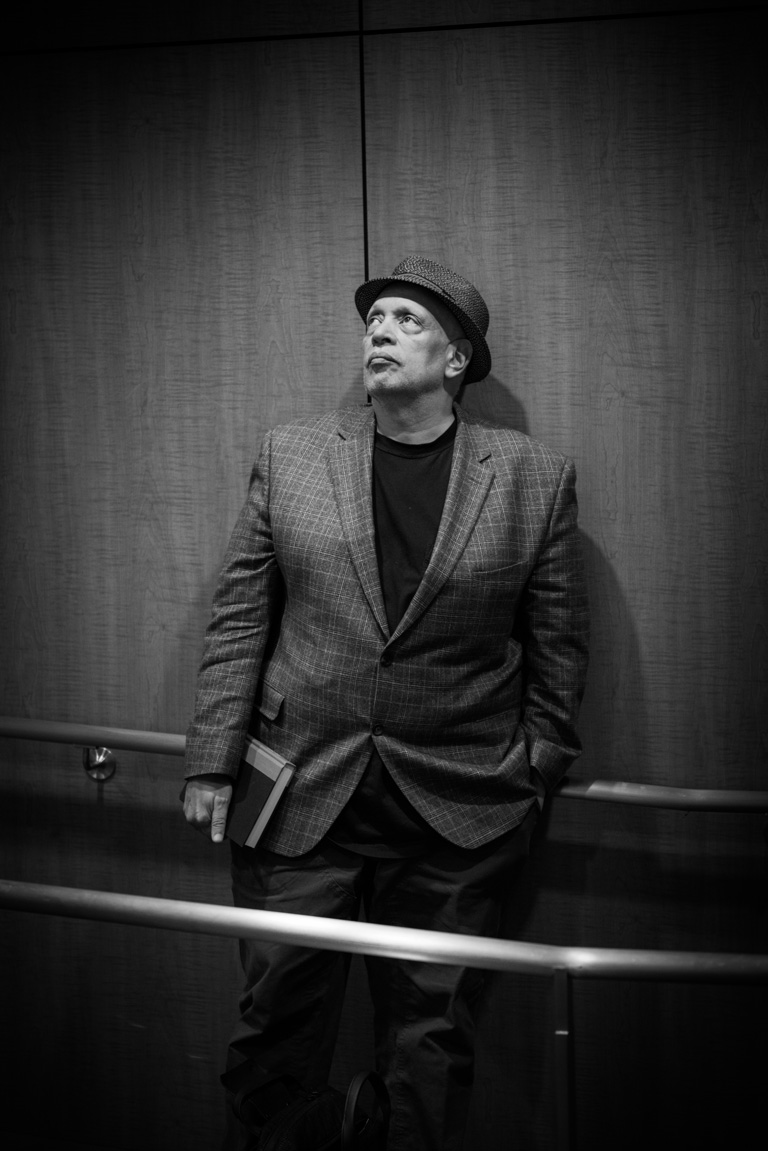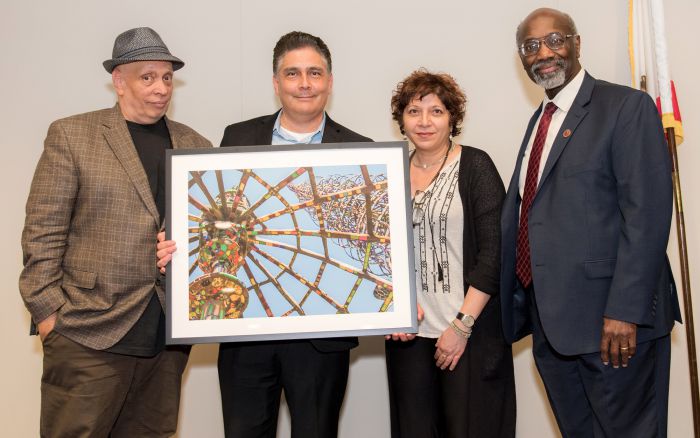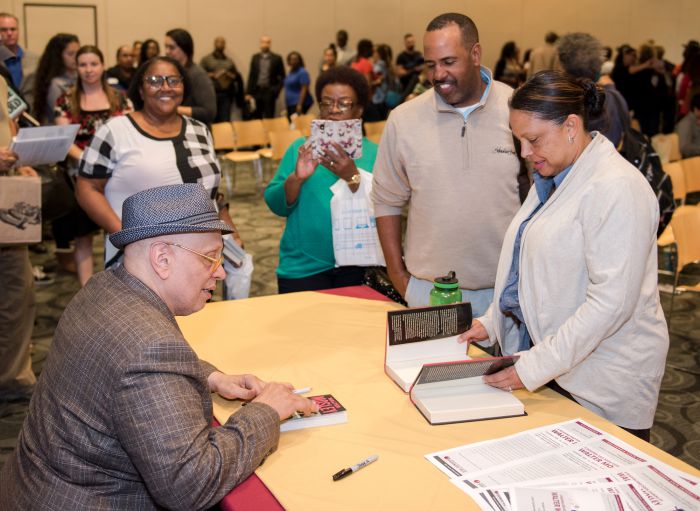
With his wryly clever conversational style, best-selling author Walter Mosley charmed a packed Loker Student Union ballroom after stopping by California State University, Dominguez Hills (CSUDH) Feb. 16 for a reading from his novel “Little Scarlet,” and to share thoughts about writing, racial inequity, and his personal reflections of the Watts Rebellion.
Mosley was the guest speaker for the Department of English 2016 Patricia Eliet Memorial Lecture. He is a prolific writer of more than 40 books–ranging from crime novels to literary fiction–and is widely recognized for his Ezekiel “Easy” Rawlins detective series based in Watts, which includes the first book in the series “Devil in the Blue Dress,” as well as “Little Scarlet.”
“I’m going to read the first three chapters of ‘Little Scarlet’ because I think that he [Easy] covers the experience of the riots as I remember it,” said Mosley.
In “Little Scarlet,” Mosley drew from his personal experiences as a young man living in Watts in 1965, the year the five-day rebellion took place. The beginning of his reading found Easy Rawlins navigating a burned out shoe repair store to help the German shop owner who was trying to explain to an angry and indifferent African American customer that his shoes had been lost in the fire. His dramatic reading was descriptively subtle, yet vivid enough to bring to life the narrative in a way that enabled the audience to easily imagine the somber setting, and experience the despair and rage of the rebellion.
Mosley’s reading was a significant occasion in CSUDH’s year-long commemoration of the Watts Rebellion, which 50 years ago resulted in the relocation of the university from Palos Verdes some 15 miles inland to serve not just students in the South Bay beach cities, but those in the inner city who previously lacked access to higher education.
At the beginning of the rebellion, a young Mosley found himself traveling by car through the chaotic streets of Watts with other members of the Afro-American Traveling Actors Association to perform at a local playhouse. The playhouse was empty, due to the riot, so the troupe drove back to their homes.
“When I got home my father was sitting there drinking, which wasn’t unusual, and he was very somber. I said, ‘Dad, is something wrong?’ And he said, ‘Yes, they’re out there rioting, Walt!’” Mosley shared. “My dad said, ‘I know it’s wrong, but I want to do it, too, but I can’t do it because it’s wrong. But I want to.’ I think that was my big lesson. The big lesson was the ambivalence of rage, violence–belonging and not belonging. It was the best lesson I could ever get about being black.”
While revisiting “Little Scarlet” to prepare for his reading at CSUDH, Mosley realized that what he was “thinking about” 15 years ago when he wrote the book had changed.
“I think you hear all the various kinds of tones of the riot in there, and the causes, but when I thought about it the day before yesterday, I sat down and started writing,” he said. “So I wrote this thing for you all. It’s what I think today. It’s a little different.”
The Watts Riot, later known as a rebellion, was a naturally occurring phenomenon that was also a harbinger of change. It was not a revolution, or a movement with specifically designed political goals, it wasn’t the brainchild of a party or a group, or even a single definable shared notion. It was an outpouring of rage that had been simmering for centuries. It was very hot that summer, and the police had been killing and beating black men and women with the same regularity that they do today. We didn’t have video recording cell phones back then, but we didn’t need proof. The police were more than happy to tell us what they were willing to do to us.

And yet, in a way, the Watts Riots was like the hip-hop movement with 10,000, 100,000, 1 million individually moving parts. We had been forced into segregated neighborhoods, schools, and hectored by unemployment. Our images had been effectively erased from history, current events, popular culture, advertisements, and the names of the streets, schools, public buildings, and of course most of our political representation belonged to so-called white people. One was the number, white was the color. This was a given, and we were the souls it was taken from.
So without rallies, political leaders, or complex belief systems, thousands of like-minded people came together to deliver a stream of consciousness message that shocked and deeply frightened the entire nation. The word was out, we were not going to take it anymore. We weren’t going to accept our roles, or the many decades more they predicted before we had complete equality. No more niggers or boys, son or mammy–we would read our own books, make our own movies, and set fire to the kindling of the world ready to burn.
It was not nonviolent, peaceful, or according to the rule of law that had reigned over us since the beginning of this great thief of a nation. The land we labored on had been taken from the indigenous people, first by the Spanish, and then by the descendants, mainly of Britain. Was it right to burn down property, to loot and shoot, and call for the death of those who have been murdering us, or looking away from our murder scenes before anyone could remember? Was it right? No. Of course not. What could be right in the rape camps of Congo? What could be right in wars raged for profit? What could be right when so-called undocumented laborers don’t have the same break that the Irish, Italians, Polish and every other European had? What could be right when you know your rage is wrong, but that does not lessen the pain of your desire for revenge?
Sometimes there is no right way, only the depressions of your heart. The burnings of the stores of Watts was like Jimi Hendrix sacrificing his guitar after an exceptionally good concert. From the ashes might rise a Phoenix, no one knows, but sometimes you just had to act on fate. The Watts Riots, the rebellion, was in part what a democracy is all about. Yes you vote every two, four, six years, but in the interim one or more of the 50,000 lobbyists speak to your representatives every day. They bring to rich man’s desires and coffers to bear upon the Congress persons and members of the executive branch. They hire lawyers to write the laws for Congress. They hire ex-reps as million-dollar-a-year lobbyists of the future. They guide the Congress, not your once in a while vote.
We need to be in the streets every day making the rulers nervous. We need to say out loud that their profit should not be a byproduct of our blood. We need to march, and boycott, and threaten just like we are threatened and beaten and murdered, and worst of all, ignored. We need to redefine the so-called minorities of the ghettos that they have built in our minds. That was, I believe, the unconscious motive of the Watts Riots, to throw off the yoke of unrestricted capitalism, racism and sexism. We were angry, and nobody knew it. We were ready for change when they were happy to leave things the way they were. They are happy today with global warming, global warfare, and global domination of all the markets making our labor a little more than slavery.

We need to hold them accountable for the devalued lives that they have created for us. I’m not suggesting a riot, because that kind of expression burns out. What I want, what I believe, is that we should, each and every one of us, set aside an hour a day to put our own pressure on the warmongers, prison masters, legislators, and law enforcement. We should find our own individual ways, and through that we will find each other. And then we will grow a national, an international movement that will be a self-sustaining riot, aimed at the hearts of those who want us to simmer and die in the all-encompassing ghetto of the modern world.
Following the reading of the letter, Mosley fielded questions from the audience, including one regarding his thoughts of the “Black Lives Matter” movement.
“It’s interesting to talk about. So many people are unhappy with that [movement] because, you know, they say ‘All lives matter.’ Yeah, but we all know it’s your lives that matter. But at the same time, I need to remember, and I need to remind my brothers and sisters, that when you look at something like The Oscars, it’s a similar thing; black people are not getting this, black people are not getting that. We hear that all the time. But are you seeing a Latino or Chicano man or woman nominated for The Oscars, or Asians and Native Americans? Never,” said Mosley. “The thing is, you have to start with Black Lives Matter, but also remember there’s a larger world, and understand that black is a metaphor. Any guy who is running away from a police officer and gets shot down–I feel bad for that guy. I don’t care if he is white. I’m just thinking, ‘Why did you shoot that guy?’”